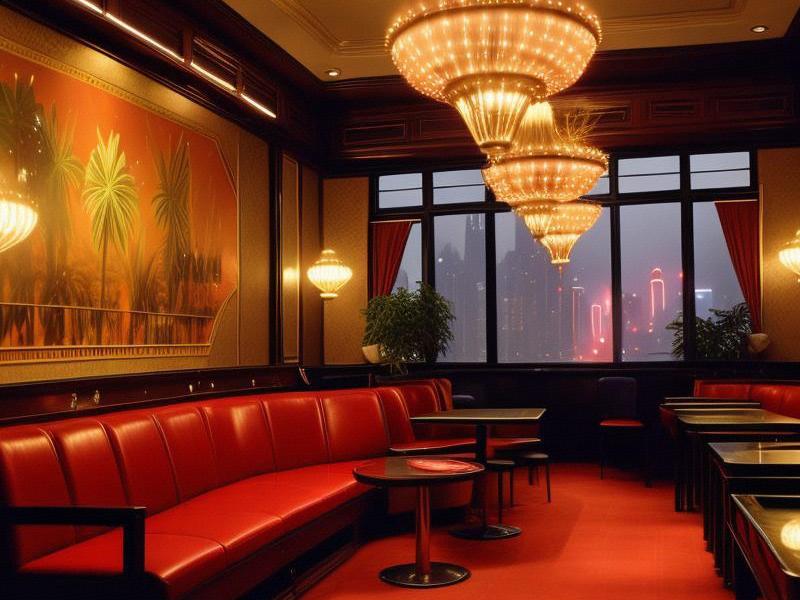This article delves into the vibrant world of Shanghai's entertainment halls, exploring their historical significance, transformation over time, and their role in contemporary urban life. It highlights how these venues serve as a bridge between traditional culture and modern entertainment, offering a unique experience for locals and tourists alike.

Shanghai, a city that has always been at the forefront of China's modernization, is not only known for its towering skyscrapers and bustling streets but also for its rich cultural heritage. Among the many cultural landmarks that dot the city, entertainment halls stand out as a unique blend of tradition and modernity. These venues, which have been a staple of Shanghai's urban life for over a century, continue to evolve, offering a glimpse into the city's past while adapting to the demands of the present.
The concept of entertainment halls in Shanghai dates back to the late 19th and early 20th centuries. During this period, the city was a melting pot of cultures, with influences from China's hinterland and foreign countries. Entertainment halls emerged as a popular form of leisure activity, providing a space for people to relax, socialize, and enjoy various forms of entertainment. These halls were typically located in bustling areas and catered to a diverse audience, including workers, merchants, and expatriates.
In the early days, entertainment halls in Shanghai offered a mix of traditional Chinese performances such as Peking opera, Kunqu opera, and storytelling, as well as Western-style entertainment like magic shows and dance performances. The halls were often decorated with intricate carvings and traditional Chinese motifs, reflecting the cultural diversity of the city. They became a hub for cultural exchange, where people from different backgrounds could come together to appreciate the arts.
One of the most famous entertainment halls in Shanghai was the "Great World" (Da Shijie), which opened in 1917. Located in the heart of the city, it was a multi-purpose venue that offered a wide range of entertainment options, including theatrical performances, acrobatics, and even a food court. The Great World was known for its vibrant atmosphere and attracted visitors from all walks of life. It became a symbol of Shanghai's cosmopolitan culture and a testament to the city's ability to blend tradition with modernity.
新上海龙凤419会所
Over the years, the entertainment landscape in Shanghai has undergone significant changes. The rise of cinema, radio, and television in the mid-20th century led to a decline in the popularity of traditional entertainment halls. Many of these venues were either repurposed or closed down as people sought new forms of entertainment. However, some of the historic halls managed to survive and have since been restored, preserving their architectural and cultural significance.
In recent decades, Shanghai has witnessed a resurgence of interest in traditional culture, leading to the revitalization of entertainment halls. Modern versions of these venues have emerged, combining traditional performances with contemporary elements to appeal to a new generation of audiences. These halls serve as cultural hubs, offering a platform for local artists and performers to showcase their talents while preserving the city's rich heritage.
One such example is the "Shanghai Traditional Opera Art Center," which opened in 2004. Located in the historic former French Concession, the center houses several theaters and performance spaces dedicated to traditional Chinese opera, including Peking opera, Kunqu opera, and Yueju opera. It also features regular exhibitions and workshops, providing visitors with an immersive experience of Shanghai's cultural traditions.
上海龙凤419足疗按摩
Another notable venue is the "Shanghai Grand Theatre," which opened in 1998. While primarily known for its modern and international productions, the theater also hosts traditional Chinese performances, bridging the gap between old and new. The Grand Theatre is a state-of-the-art facility that attracts top-tier performers and productions from around the world, making it a key player in Shanghai's cultural scene.
In addition to traditional entertainment halls, Shanghai is home to a wide range of modern venues that cater to diverse tastes. These include concert halls, nightclubs, comedy clubs, and theme parks, offering a variety of entertainment options for locals and tourists. The city's vibrant nightlife, particularly in areas like the Bund and Nanjing Road, is a testament to its dynamic and cosmopolitan culture.
The transformation of Shanghai's entertainment halls reflects the broader changes in the city's urban landscape. As Shanghai continues to grow and modernize, it remains committed to preserving its cultural heritage. The revitalization of traditional entertainment halls is part of this effort, ensuring that future generations can appreciate the rich history and traditions of the city.
上海龙凤419会所
The blend of tradition and modernity in Shanghai's entertainment halls is not just a reflection of the city's cultural identity but also a source of inspiration for other cities in China and around the world. By preserving and adapting their cultural heritage, Shanghai has created a unique model for urban development that values both tradition and innovation.
For visitors to Shanghai, exploring the city's entertainment halls offers a fascinating glimpse into its past and present. Whether it's watching a traditional opera performance at the Shanghai Traditional Opera Art Center or enjoying a live music concert at the Shanghai Grand Theatre, there is something for everyone to enjoy. These venues not only provide entertainment but also serve as a reminder of the city's rich cultural history and its ability to embrace change.
In conclusion, Shanghai's entertainment halls are a testament to the city's vibrant cultural scene and its commitment to preserving its heritage. From the historic Great World to the modern Shanghai Grand Theatre, these venues offer a unique blend of tradition and modernity, reflecting the dynamic spirit of the city. As Shanghai continues to evolve, its entertainment halls will undoubtedly remain a cornerstone of its cultural identity, attracting visitors from around the world who seek to experience the best of what the city has to offer.